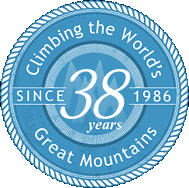
Patagonia Trek Frequently Asked Questions
This information should answer many of your initial questions and also guide you through the next stages of preparing for the expedition. If you have any questions, please feel free to contact us: office@mountainguides.com
What's the best way to train for this trek?
The best training for trekking is trekking (aka hiking). Get outside and log some miles in your boots while carrying a pack. Concentrate on your heart, legs and lungs. Climb or hike at any opportunity. You will enjoy the trip more if you are properly prepared. An aerobic program of running, swimming or bicycling, plus a conditioning program for the thigh muscles is strongly recommended. Running stairs, weight training or similar programs are excellent.
What is the weather like?
Seasons in the southern hemisphere are opposite of what we have here in the States. Spring is Fall, Summer is Winter and so on. In March we'll likely see high temperatures in the 60's and 70's and lows in the 40's, perfect trekking and sleeping temperatures. Keep in mind harsh weather is always a possibility in Patagonia and wind will likely accompany us on the trail.
How do I get there?
Seats can sometimes be in short supply to South America, and flight schedules can change frequently.
International Mountain Guides has worked for many years with the staff at CTT Destinations to provide professional travel service for participants in our programs. For help with your plans, we urge you to contact Pirjo DeHart at CTT Destinations: 425-831-0367 or pirjo.dehart@cttdestinations.com
Do I need visa?
U.S. citizens entering Chile must have a valid passport. U.S. citizens traveling to Chile for recreation, tourism, business, or academic conferences do not need to obtain a visa prior to their arrival to Chile. A Tourist Card will be issued for a stay of up to 90 days upon entry. Currently, there is no reciprocity for US citizens.
Citizens of other nations are advised to check the Visa Mapper for requirements: visamapper.com »
Do I need travel insurance?
We invest in insurance coverage for commercial liability and medical and disability insurance for our employees while participating on our programs. We cannot insure you for your personal needs, but we do expect you to be as fiscally responsible as we are. We require that you insure yourself against potentially expensive difficulties that may arise. First, Trip Cancellation Insurance may provide financial relief should you be forced to withdraw from the program before it even happens. Next, make sure you have adequate Travel Insurance for coverage should you have a problem during the trip. Medical care and evacuation in remote locations can be expensive. For more information, please see our page on Trip Cancellation and Travel Insurance.
What immunizations will I need?
No immunizations are currently required to enter Chile. It is recommended that you consider the following:
- Tetanus/Diphtheria: There is no natural immunity to the tetanus toxin and since it is found throughout the world, immunization is a universal recommendation regardless of age. A combined tetanus/ diphtheria booster is available, good for ten years.
- Hepatitis Vaccine: New vaccines are available for both hepatitis A and B.
Please consult your physician or local health department for their recommendations.
You should also ask your physician for a prescription for a regimen of the antibiotic azithromycin ("Z-Pak"). Please consider this to be part of your required equipment.
We recommend that you visit the travel clinic at a major University Hospital or your local Public Health Department for the most up to date info on travel requirements, or check the Center for Disease Control Website at www.cdc.gov.

